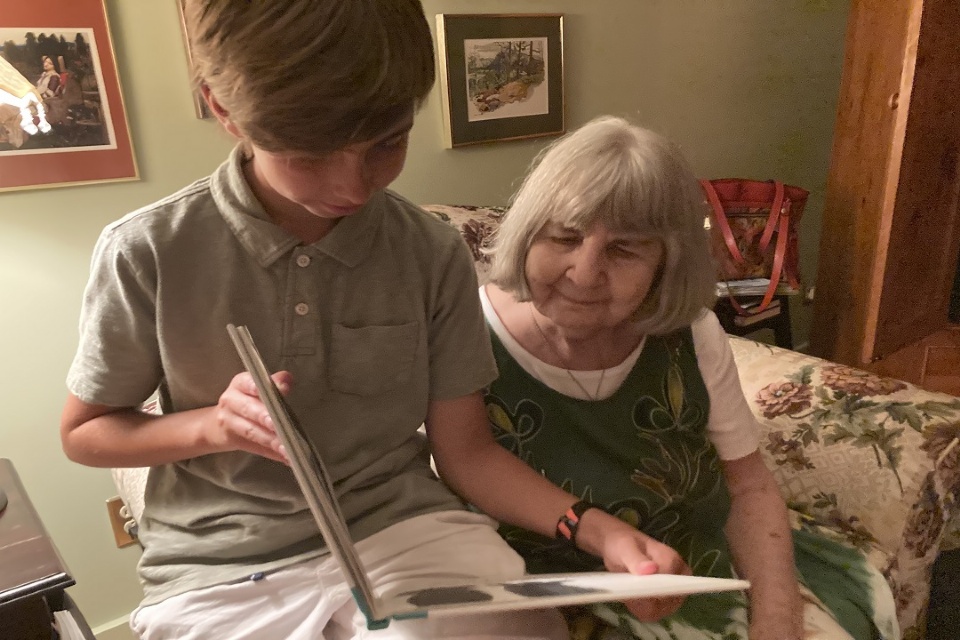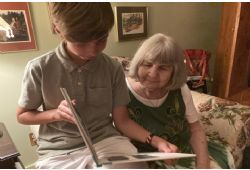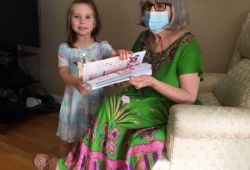From a young age, Beverly DeCarlo was always a voracious reader. And when it came to her early aspirations, her focus was razor-sharp: she wanted be a teacher. DeCarlo got married early on and had three children, but her dream continued to call to her. One day, she came across an article about a new Kindergarten class opening in Quebec, and she pounced on the opportunity. All she needed was her certification. Despite her busy family life, she travelled by bus every single day to take the classes until she graduated. That enabled her to become a teacher at the Chomedy Laval School Board.
It wasn’t glamorous at first; DeCarlo taught in the basement of a bungalow until there was enough space for regular classes. But she taught with gusto and passion, and the school board took notice. They approached her and offered her more pedagogical training. She continued with her formal educational while teaching, and eventually earned her BA in Library Science and women’s studies, along with her reading certificate. This journey took a decade, but it was well worth the wait. In her 35-year professional career, DeCarlo proved to be an exceptional educator. “I love teaching,” she says emphatically. “To me, it’s not a chore. Sure, there are administrative duties like grading and filling out report cards. But at the end of the day, it’s about being with children and I thoroughly enjoyed every minute of that.” One of DeCarlo’s legacies was the Readers-Writers Summer Workshop that she created. It was a summer program, but unlike regular summer school. It was reading and writing focused, with intimate classes of no more than 15 students. The lessons were structured in a way that experimented with different teaching approaches.In short, teachers did not expect their students to sit at their desk and keep quiet for three hours. Instead, the classes were highly interactive and encouraged critical thinking. The day always began with a read-aloud, and the students got to pick the stories. They spent time writing every day, but they had agency and freedom. They were able to write about anything they wanted, in whatever form they preferred. Since classes were small, teachers were able to work with each student individually. After writing their first draft, students learned the important of revision and editing. They ultimately published their little books.Once their stories were finished, each student read their work to the group. For DeCarlo, this was key. “Feeling like you’re being heard is an important thing, especially for young children,” she says. “Their stories weren’t tucked away in a folder, never to be seen again. They always had an opportunity to share them with the rest of the students.”The teachers also used the stories to interact with the children and provide experiential learning. For example, they did such activities as baking muffins or cookies. It was a way to connect stories and literature with life in an obvious way, so children could see both the relevance and the magic of the written word. The students regularly brainstormed together and inspired one another, all while learning in a low pressure situation.What’s more, the Readers-Writers Summer Workshop did not discriminate. They accepted children at any level. Some were proficient readers and writers, while others were reluctant readers. DeCarlo asserts that especially with reluctant readers, they should be encouraged to read for the sake of reading, and not as work. “I always let the children read what they wanted to read, that’s the most important thing,” says DeCarlo. “My objective was to get them hooked on how a story can entertain them and provide an escape from their everyday lives.”The Readers-Writers Summer Workshop lasted 25 glorious years. DeCarlo has won numerous awards including the prestigious Hilroy Foundation Award. She also published a children’s book, Kyle’s Rainbow, and though she’s retired from teaching, she remains a voracious reader to this day.
 In The Latest Issue:Latest Issue:
In The Latest Issue:Latest Issue:
- A Bittersweet Farewell
- The new Laval Aquatic Co...
- The End of an Era:
Articles
Calendar
Virtual- ANNUAL TEACHER APPRECIATION CONTEST
- APPUI LAVAL
- ARTS & CULTURE
- CAMPS
- CAR GUIDE
- CCIL
- CENTENNIAL ACADEMY
- CHARITY FUNDRAISING
- CITYTV
- COSMODÔME
- COMMUNITY CONNECTIONS
- COVER STORY
- DINA DIMITRATOS
- ÉCOLE SUPÉRIEURE DE BALLET DU QUÉBEC
- EDITORIALS
- ÉDUCALOI
- EDUCATION
- EMPLOYMENT & ENTREPRENEURSHIP
- FÊTE DE LA FAMILLE
- FÊTE DU QUARTIER SAINT-BRUNO
- FAMILIES
- FESTIVAL LAVAL LAUGHS
- FÊTE DE QUARTIER VAL-DES-BRISES
- FINANCES
- GLI CUMBARE
- GROUPE RENO-EXPERT
- HEALTH & WELL-BEING
- 30 MINUTE HIT
- ANXIETY
- CHILDREN`S HEALTH & WELLNESS
- CLOSE AID
- DENTAL WELLNESS
- EXTREME EVOLUTION SPORTS CENTRE
- FONDATION CITÉ DE LA SANTÉ
- GENERAL
- HEARING HEALTH
- MESSAGES FROM THE HEALTH AGENCY OF CANADA
- MENTAL HEALTH
- SEXUALITY
- SOCIAL INTEGRATION
- SPECIAL NEEDS
- TEENS
- THE NUTRITION CORNER
- THE NUTRITION CORNER - RECIPES
- VACATION DESTINATION
- WOMEN'S FITNESS
- WOMEN'S HEALTH
- HILTON MONTREAL/LAVAL
- HOME & GARDEN
- INTERNATIONAL WOMEN'S DAY
- JAGUAR LAVAL
- LAVAL À VÉLO
- LAVAL FAMILIES TV SHOW
- LAVAL FAMILIES MAGAZINE CARES
- LAVAL URBAN IN NATURE
- LE PARCOURS DES HÉROS
- LES PETITS GOURMETS DANS MA COUR
- LEON'S FURNITURE
- LEONARDO DA VINCI CENTRE
- LFM PREMIERES
- LIFE BALANCE
- M.P. PROFILE
- MISS EDGAR'S AND MISS CRAMP'S SCHOOL
- MISSING CHILDREN'S NETWORK
- NETFOLIE
- NORTH STAR ACADEMY LAVAL
- OUTFRONT MEDIA
- PASSION SOCCER
- PARC DE LA RIVIÈRE-DES-MILLE-ÎLES
- PÂTISSERIE ST-MARTIN
- PIZZERIA LÌOLÀ
- PLACE BELL
- PORTRAITS OF YOUR MNA'S
- ROCKET DE LAVAL
- SACRED HEART SCHOOL
- SCOTIA BANK
- SHERATON LAVAL HOTEL
- SOCIÉTÉ ALZHEIMER LAVAL
- STATION 55
- STL
- SUBARU DE LAVAL
- TECHNOLOGY
- TEDXLAVAL
- TODAY`S LAURENTIANS AND LANAUDIÈRE
- TODAY`S LAVAL
- WARNER MUSIC
- THIS ISSUE
- MOST RECENT
Magazine
Articles ~e 105,7 Rythme FM 4 chemins Annual Teacher Appreciation Contest Appui Laval Arts & Culture Ballet Eddy Toussaint Camps THIS ISSUE MORE...
CONTESTS Enter our contests
CONTESTS Enter our contests
CALENDAR
Events & Activities
COMMUNITY Posts Events
PUBLICATIONS Our Magazine Family Resource Directory
LFM BUSINESS NETWORK Learn more
COUPONS Click to save!
COMMUNITY Posts Events
PUBLICATIONS Our Magazine Family Resource Directory
LFM BUSINESS NETWORK Learn more
COUPONS Click to save!
SUBSCRIPTIONS
Subscribe to the magazine
Un-Subscribe
E-NEWSLETTER Subscribe to our E-newsletter Un-Subscribe
WRITE FOR US Guidelines & Submissions
POLLS Vote today!
E-NEWSLETTER Subscribe to our E-newsletter Un-Subscribe
WRITE FOR US Guidelines & Submissions
POLLS Vote today!
ADVERTISERS
How to & Media guide
Pay your LFM invoice
SUGGESTIONS Reader's Survey Suggest a Listing
LFM About Us Our Mission Giving Back Contact Us
SUGGESTIONS Reader's Survey Suggest a Listing
LFM About Us Our Mission Giving Back Contact Us
 PICK-UP LOCATIONS
Get a copy of LFM!
PICK-UP LOCATIONS
Get a copy of LFM!
TERMS & CONDITIONS Privacy | Terms
ISSN (ONLINE) 2291-1677
ISSN (PRINT) 2291-1677
Website by ZENxDESIGN





 BY:
BY: 
Tweet
Share